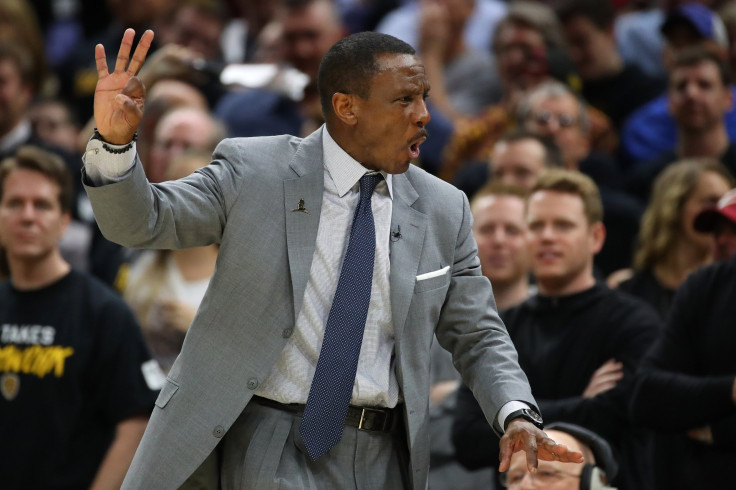Why The Toronto Raptors Fired Dwane Casey: LeBron James, Kyle Lowry, DeMar DeRozan All Played Roles

The Toronto Raptors announced late Friday morning that they have parted ways with head coach Dwane Casey. The news comes four days after the team was eliminated from the 2018 NBA playoffs.
“After careful consideration, I have decided this is a very difficult but necessary step the franchise must take. As a team, we are constantly trying to grow and improve in order to get to the next level,” Toronto general manager Masai Ujiri said in a statement. “We celebrate everything Dwane has done for the organization, we thank him, and we wish him nothing but the best in the future. He was instrumental in creating the identity and culture of who we are as a team, and we are so proud of that.”
There was speculation that Casey might not return to the team for the 2018-2019 season. Toronto was swept by the Cleveland Cavaliers in the second round following a 59-win season that earned them the No.1 seed in the Eastern Conference. It was another playoff disappointment for the Raptors during Casey’s tenure.
Casey became Toronto’s head coach in the 2011-2012 season. He led the Raptors to at least 48 wins in each of the last five years. The team made their only trip to the Eastern Conference Finals in 2016, and it was the only season during that span in which Toronto won a game beyond the first round.
Most of Toronto’s postseason failures can be credited to LeBron James and the Cleveland Cavaliers. The Cavs have eliminated the Raptors from the playoffs in three straight years, including two consecutive sweeps in the semifinals. Toronto has lost 10 straight playoff games—five of which have come at home—to Cleveland.
No one from the East has been able to stop James over the last eight years. He’s reached the NBA Finals in every year since 2011.
This, however, was supposed to be the year in which Toronto could finally defeat the league’s best player, in large part because of adjustments Casey made. The head coach revamped Toronto’s offensive system, despite the regular-season success they had attained.
The changes worked. A system that promoted more ball movement and more three-pointers—Toronto went from 30th to sixth in assists and from 21st to fourth in threes—helped the Raptors win eight more regular-season games. They even entered the conference semifinals as the betting favorites to defeat the Cavs.
But none of that seemed to matter when Toronto faced the player that had crushed their hopes time and time again.
The Raptors blew a late lead in Game 1 and were embarrassed at home in Game 2. A LeBron James game-winner in Game 3 ended any chance Toronto had of making a comeback, and they might as well have stayed home for the Game 4 blowout.
Casey didn’t have a good series, though he was hardly Toronto’s main problem. It’s hard to believe that any team in the East can defeat the league’s best player when he puts up averages of 34.0 points, 11.3 assists, 8.3 rebounds and 55.3 percent shooting for an entire series.
Perhaps Casey would’ve been retained had Toronto extended the series to six or seven games. The Raptors wilted under pressure and showed little heart at times when things got tough.
Kyle Lowry and DeMar DeRozan, in particular, came up short when the Raptors needed them the most. Lowry was nowhere to be found when the Cavaliers took control of the two games in Toronto, and he scored just five points in Game 4. DeRozan totaled 21 points in the two contests in Cleveland when the team’s season was on the line.
Lowry and DeRozan have been as much a part of Toronto’s postseason failures as Casey. Despite making the All-Star team in each of the last three seasons, neither guard is the superstar that the Raptors had hoped they might be.
Getting rid of the coach is a much easier change to make than shaking up one of the NBA’s best backcourts, even if it’s not the right answer.
Lowry, 32, is owed more than $64 million over the next two seasons. DeRozan has $27.7 million coming to him in each of the next two years with a player option for the same salary in 2020-2021.
Toronto would be hard-pressed to get close to equal value for either guard because of how much money they are set to make. Casey was entering the final year of his contract, making him the obvious scapegoat.
According to multiple reports, Toronto could look to replace Casey with Mike Budenholzer. Budenholzer took the Atlanta Hawks to the playoffs in four of his five seasons as the team’s head coach.
Budenholzer’s most successful season came in 2015 when he won the NBA's Coach of the Year award, leading Atlanta to 60 wins and the best record in the East. Much like Casey and the Raptors, the Hawks' year came to a screeching halt when they were swept by James and the Cavs in the Eastern Conference Finals.
It was just two days ago that Casey was named the NBA’s Coach of the Year by his peers. He could win the same award that was voted on by members of the media next month.
None of that was enough to save Casey’s job as the Raptors try to fix a problem that goes far beyond their head coach.
© Copyright IBTimes 2024. All rights reserved.












